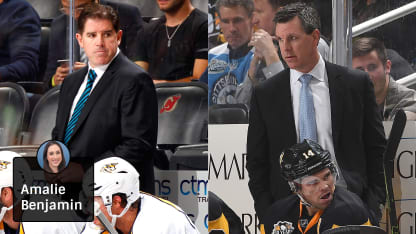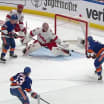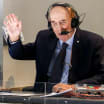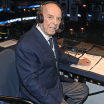It was 2002 and, after 709 games in the NHL, Mike Sullivan's career was coming to a close. He was 32, and had time stretching out in front of him. So he turned to someone he had known for a long time, someone who had known his family, lived two towns over and had coached him long ago, in the International Hockey League with the San Diego Gulls.
Stanley Cup Final coaches have common roots
Peter Laviolette of Predators, Mike Sullivan of Penguins born in Massachusetts, began careers in Bruins organization

"I remember when he retired from hockey and we were looking for a coach with the Providence Bruins] and he approached me," Mike O'Connell, then the general manager of the Boston Bruins and now a senior adviser and development coach with the Los Angeles Kings, said this week. "He said, 'Mike, if you have a coaching position and there's going to be an opening. I'll put my name in the hat.'
"I said, 'Mike, I don't know if I really want to do that to you. Because coaching's a difficult thing. Are you sure you want to do this?' He said, 'Yeah, I want to give it a shot.'"
***[\[RELATED: Complete Penguins vs. Predators series coverage\]*
Sullivan got the job with the Providence Bruins of the American Hockey League, a spot that had proven to be a breeding ground for future NHL coaches. Three years earlier, another rising talent had held that same position and won a championship, turning that into a job as an assistant with the Bruins before becoming coach of the New York Islanders. His name: Peter Laviolette.
Though Sullivan and Laviolette narrowly missed each other in Boston, with Laviolette leaving to coach the Islanders in 2001 and Sullivan joining the organization in 2002 as coach at Providence, they're seeing plenty of each other now.
Laviolette, the coach of the Nashville Predators, and Sullivan, the coach of the Pittsburgh Penguins, are behind the benches in the Stanley Cup Final, the first time two U.S. coaches have opposed each other for the NHL championship.
The Penguins lead the best-of-7 series 2-0. Game 3 is Saturday in Nashville (8 p.m. ET; NBCSN, CBC, SN, TVA Sports).
Each was born in Massachusetts (Laviolette in Franklin, Sullivan in Marshfield) and was hired initially in the American Hockey League and NHL by the same man, O'Connell.
Talk about a small world.
"I think [they were] similar in a lot of ways," said Jeff Gorton, then the assistant GM under O'Connell and now the general manager of the New York Rangers. "They were both young when they were starting out, finishing as players, but they both had an obvious presence when they started coaching, how they handled their team, how they handled practices. They just had an 'it' factor.
"You could tell right away they were going to be successful."
Their paths diverged after similar starts. Laviolette went from the Islanders to the Carolina Hurricanes, who he led to the Stanley Cup in 2006, to the Philadelphia Flyers, who he took to the Cup Final in 2010, to the Predators.
Sullivan got his shot as coach of the Bruins but lasted only two seasons, bookending the 2004-05 NHL lockout. He did not get another chance as an NHL coach until last season, when he was a midseason replacement who went on to win his own Stanley Cup with the Pittsburgh Penguins.
"Mike Sullivan got the job with the Bruins and, in retrospect, he perhaps wasn't ready at the time and actually went on to a number of other jobs before Pittsburgh finally thought that he was ready, which he has certainly proven to be," said longtime Boston GM Harry Sinden, who preceded O'Connell in the job and is now a senior adviser with the Bruins.
"He was young then and just getting into such a big job, so in retrospect it might have been a little quick for us to bring him in. But I'm sure he learned an awful lot with that experience that's helping him now."
He did.
"Any time a coach has his first coaching experience, it's an important experience," Sullivan said. "They're going to do certain things well, and they're going to do certain things where they might look back and reflect and say I need to be better in those areas. It was a learning experience for me at the same time.
"It's still close to my heart, even though it was a difficult experience down the stretch there in the last part of my tenure. But that's the life of a coach in the NHL."
Part of that, in Gorton's opinion, was that Sullivan was "a victim of circumstance," rather than of any issues on his end, something that has been proven to be true with his success during the past two seasons.
Each had shown that he had promise back then. Each had shown that he had the makings of greatness behind the bench.
O'Connell had, in fact, had previous experience with both Sullivan and Laviolette, having coached Sullivan in San Diego and Laviolette in Providence in 1992-93. They were, as he said, "real good teammates, easy to coach."
"Both are extremely bright -- they were bright young men -- and have turned into extremely bright men, great NHL coaches," O'Connell said. "They both listened intently. They're good teammates; they followed directions very easily. They understood the meaning of team."
It was something that O'Connell first noticed in Laviolette when he was coaching him in Providence.
"I remember him coming up to me, I guess I was being hard on the team, and he came to me, said, 'Mike, you've got to ease up. We're going to be fine,'" O'Connell said. "'It takes a while to build this, we're going to build this team, but we have a good team, it's going to take some time.' He was absolutely right. So that always stuck with me that he recognized that as a player, that we were good and he understood that it was going to take some time."
They were compared to each other back then, back when O'Connell took his shot on Sullivan, when Laviolette might have represented a missed opportunity. They had similar presences, similar backstories, having had to scratch and claw for their playing careers, for the 709 NHL games for Sullivan and 12 for Laviolette.
"A lot of people that haven't had success [yet] don't necessarily have that presence when they walk in a room, and these two guys definitely always had it," Gorton said. "I would put them more in the natural category, Peter and Mike. They always had that ability to captivate a room and get their message across pretty quickly."
That message, clearly, continues to come across.
For the men who were there at the beginning and helped boost Sullivan and Laviolette into their coaching careers, it is gratifying to see them at this point. It is gratifying for them to watch products of the Bruins go on to great heights, products of the Massachusetts hockey culture that doesn't always get its due.
"It's rewarding," O'Connell said. "You see something in young men, whether you're coaching or as a general manager or in development, like I am now, you see things and you see a spark or you see something good in people. … They both have won Stanley Cups and the fact that they're both from Massachusetts and me being from Massachusetts, I'm very proud of the fact that it's not only two Americans, but two from Massachusetts that I had some influence on."
He's not alone.
"I think it says something for the interest in the entire New England community in the game itself," Sinden said. "We sometimes go unnoticed in the spring and the summer, but there's tremendous interest by the young people of this community to get into hockey and be involved in hockey. To produce two Stanley Cup finalist coaches right in this area, I think it's both a high mark for U.S. hockey and a high mark for New England."

















